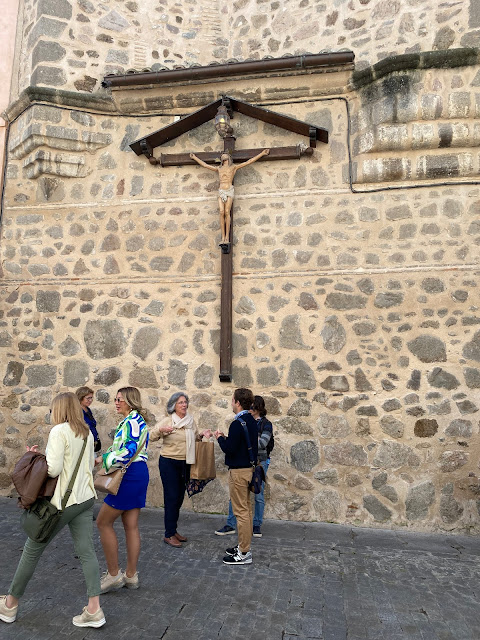Dreams
Today we hear two stories about recognizing when the Holy One shows up.
Samuel, a child who does not know God, hears someone calling him but has to learn that it is indeed God who calls, and Samuel has to be taught how to respond.
Nathaniel, who is a world-weary grownup, has firm ideas about God and where Holiness comes from and he has to unlearn what he has been taught about that so that he, too, can know when it is God who calls and how to respond.
In this season of Epiphany, this is our question as well: how do we learn to recognize the voice of God, and what are we supposed to do when we realize that the Holy One is speaking to us.
So maybe Jesus isn’t being literal here.
But how do we know when the Holy One is calling to us, and how should we respond? How do we recognize when we, like Samuel, like Nathaniel - indeed like the magi, the figures we most think of during this season - have an epiphany, that is, an experience where we grasp that some kind of divine activity is in our midst?
One of my former teachers, Brian Mahan, who is not ordained, wrote a book called “Forgetting Ourselves on Purpose: Vocation and the Ethics of Ambition” in which he uses the term “epiphanies of recruitment.”
An epiphany of recruitment is an experience through which we feel drawn to give ourselves over to a purpose beyond ourselves and to life a different kind of life. These epiphanies happen in real, regular life, and they may not make sense to anyone but us, but they are experiences of calling.
Professor Mahan tells the story of himself as a young child, sitting on a Sunday morning in his Roman Catholic parish church, his pocket filled with the coins he’d been saving from his allowance. Upon hearing a guest speaker talk about her work with the poor through the St. Vincent de Paul Society, he felt so moved that he emptied all of his dimes into the offering plate. He was just a child, but he felt in that moment a calling to something beyond himself, and he responded. Responding to vocation, he told us, is giving over oneself, one’s life, to compassion for others and for the world.
But this is not necessarily a feel good story. Professor Mahan’s father was angry at him for giving away all his money and withheld his allowance for two weeks as a punishment for being so foolish.
Divine activity often looks foolish. Popular culture rewards success over compassion and favors self-promotion over self-sacrifice. The world wants us to achieve status and amass resources for ourselves instead of giving them away for the good of the whole or using our voices to stand up for those whose voices are being discounted or drowned out.
So like Nathaniel, we have to re-frame our understanding of where the divine comes from or what divine activity really is. And like Samuel we have to learn how to listen for God, how to put ourselves into a posture of tuning in to the divine.
As we move into a new year here at St. James’s, this is our work as a parish, too: To listen out for God speaking to us. It will be our work to open our eyes to see God at work in the world around us so that we as a community of faith can join in that work as partners with God to serve our neighbors as Jesus commands.
To do that we also need to tune in to the community on the other side of our big granite columns and open our eyes to what the needs are out there to discern what we may have to offer to meet those needs and then how we might go about putting our resources to work for the benefit of our neighbors.
It’s tempting especially in a time of transition to want to circle the wagons and become a closed community. It’s tempting to reach back into the past and stay there with our work and our attitudes and our opinions. But this is not what the church is for. Later today we will hear much about the dream of Dr. Martin Luther King, Jr., but this morning I’m thinking about another dream, the dream of God as addressed by Verna Dozier, a Black Episcopal laywoman from D.C. who wrote a book by that name, The Dream of God.
It’s hard but transformative reading. She says that the Dream of God is that we Christians will follow Jesus and not merely worship him. That we will serve our neighbors instead of keeping all our resources for the purpose of preserving our institution.
Dozier explains that the church comes together on Sundays and other days to learn, to be fed spiritually, to deepen our relationships with God and one another. That is The Church gathered.
But then we're supposed to go out into the world to follow Jesus, to serve our neighbors, to minister to them, to be in real relationship with them. This is The Church scattered.
And we are called to be both, both The Church gathered here, to pray, to hear our stories, to sing, to be fed, to give thanks; and also The Church scattered, following Jesus out into the world to work for God’s dream of life and reconciliation and peace right here in our city.
God’s dream for us is that we will listen for and notice those epiphanies of recruitment that show up as we are just living our lives, and respond by giving over our selves to compassion for others and for the world. Maybe you'll have one of those epiphanies today or tomorrow, here in this space or over in Valentine Hall.
So let’s pay attention. Let’s listen. Let’s respond. Let’s join in God’s dream.



Comments